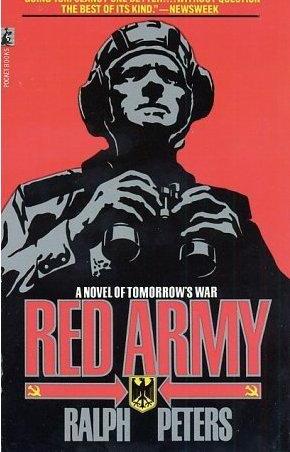
Red Army
Ralph Peters
402 pages
published in 1989
Infinity star general Ralph “Blood ‘N Guts” Peters (as seen on Alicublog) is one of the more loonier cheerleaders for the War on Musl^wTerror. He’s a firm believer in both what Matt Yglesias dubbed the Green Lantern Theory of Geopolitics where America just needs the Will to vanquish its enemies and nothing else and in the unlimited threat of the Islamofascist menace, which so far, apart from a few exceptions, has been pretty weak. It’s not an uncommon strain in American conservatism, this doublethink about America being both the strongest and bestest country on Earth and its unique vulnerability to the enemy du jour, which is so much more cleverer, stronger and dedicated than the American people. It’s no surprise then that Peters has written a future war novel about a succesful Soviet invasion of West Germany, in 1989, just as the Berlin Wall fell, the Warsaw Pact countries overthrew their communist leaders and the USSR looked on without firing a shot in their defence. Of course, he’s not the only one to have been surprised by the fall of the Soviet Union; plenty of science fiction writers were embarassed too. Still, it’s typical of the man that he would write a novel warning of the dread Soviet threat at the exact moment it was all revealed to be hollow.
The main reason I bought Red Army then when I saw it at a secondhand bookstore was to have a laugh, to see what Peters would make of it. I expected it would be dreadful, with awful prose and awful writer, but in fact it turned out to be quite readable. His writing is easily on a par with the king of technothrillers, Tom Clancy, which is damning with faint praise, I know. But then you don’t expect good writing with these sorts of novels. Peters writes clearly, is good at describing the nature of war without bogging down into needless details, keeps the story moving quickly and uses immediately recognisable if stock characters: the young conscript with no clue what’s happening, the grizzled Afghanistan veteran airborne captain, the dedicated, toughminded but fair general and so on, and so on. Interestingly enough, unlike other World War III novels, Red Army is written solely from the Russian point of view and they get to win too. One further point in Peters’ favour is that he doesn’t share Clancy’s tendency to geek weapon systems and describe endless details of the weapons used. Peters talks about tanks, “the big guns of the battallion”, the “company’s fighting vehicles” rather than T-72s or BMP-1s.